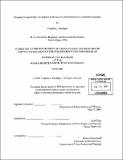| dc.contributor.advisor | Chris Tilly. | en_US |
| dc.contributor.author | Doellgast, Virginia L. (Virginia Lee), 1976- | en_US |
| dc.contributor.other | Massachusetts Institute of Technology. Dept. of Urban Studies and Planning. | en_US |
| dc.date.accessioned | 2011-09-13T17:43:36Z | |
| dc.date.available | 2011-09-13T17:43:36Z | |
| dc.date.copyright | 2001 | en_US |
| dc.date.issued | 2001 | en_US |
| dc.identifier.uri | http://hdl.handle.net/1721.1/65727 | |
| dc.description | Thesis (M.C.P.)--Massachusetts Institute of Technology, Dept. of Urban Studies and Planning, 2001. | en_US |
| dc.description | Includes bibliographical references (leaves 95-101). | en_US |
| dc.description.abstract | In this study, I evaluate a cooperative cleaning business's success in improving employment outcomes for immigrant workers. Cooperative business development is often undertaken as a community economic development strategy that seeks to promote better work experiences for those with limited employment options. The argument that ownership and control in the workplace are key features of such a strategy is superficially easy to accept, but becomes more problematic when trade-offs among goals and outcomes are introduced. To better understand the nature of these trade-offs, I compare employment outcomes and business strategy across four different cleaning companies: a cooperative cleaning business, a maid service franchise, a unionized janitorial firm, and an independent housecleaner. While wages and benefits do not differ substantially across the four cases, cooperatives provide opportunities for training and mobility, control over work and over management of the business, and a sense of satisfaction that are unusual in the cleaning industry and of value to their members. These findings are tempered by the observation that these cleaning cooperatives remain a scattered set of experiments that often must struggle to sustain themselves. Enjoying the benefits of cooperative ownership may require members to sacrifice time and salary, and may in the short-term hamper business growth and profitability. The strategies used by successful cooperative and non-cooperative cleaning businesses provide a useful guide to these businesses as they seek to meet the dual goals of providing better work experiences for their members and successfully competing within the cleaning industry. | en_US |
| dc.description.statementofresponsibility | by Virginia L. Doellgast. | en_US |
| dc.format.extent | 101 leaves | en_US |
| dc.language.iso | eng | en_US |
| dc.publisher | Massachusetts Institute of Technology | en_US |
| dc.rights | M.I.T. theses are protected by
copyright. They may be viewed from this source for any purpose, but
reproduction or distribution in any format is prohibited without written
permission. See provided URL for inquiries about permission. | en_US |
| dc.rights.uri | http://dspace.mit.edu/handle/1721.1/7582 | en_US |
| dc.subject | Urban Studies and Planning. | en_US |
| dc.title | Cleaning cooperatively : an analysis of the success and potential of a cooperative business | en_US |
| dc.type | Thesis | en_US |
| dc.description.degree | M.C.P. | en_US |
| dc.contributor.department | Massachusetts Institute of Technology. Department of Urban Studies and Planning | |
| dc.identifier.oclc | 49732421 | en_US |
